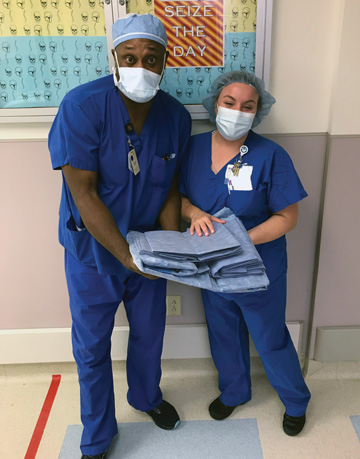Sometimes a problem is nothing more than an opportunity in disguise. That’s certainly the case with Houston Physicians’ Hospital in Webster, Texas, the winner of this year’s OR Excellence Award for Environmental Stewardship. Last year, when it became difficult to purchase disposable instrument wraps — a critical item needed to process vendor trays and ultimately perform surgeries — the hospital did a little digging and quickly discovered that perhaps not being able to purchase this item wasn’t the true problem.
“Disposable blue wrap was identified as one of the greatest areas of waste in our facility,” says Karen Acosta, MSN, RN, CNOR, the hospital’s director of surgical services and the cath lab. “We realized that we were wasting money and adding to the massive amount of trash with every surgical case we performed.”
The amount of waste these wraps generated for total joint cases alone was staggering. For instance, the surgical team goes through eight to 15 instrument trays for a single joint replacement, and on Mondays alone the hospital performs between eight and 10 such cases. That doesn’t even account for the other procedures involving implants, such as spine and other ortho cases, that also use a significant number of instrument trays.
Initially, leadership at Houston Physicians’ believed they simply didn’t have an alternative to continuing to use blue wrap. But Ms. Acosta says issues with supplies of disposables forced the staff to consider potential solutions. The investigation eventually led them to wrapping sterilized instruments in surgical cloth. “Our questions became, does anyone else use reusable cloths, where can we purchase them and how reliable are they?” says Ms. Acosta.
Once they found the right vendor, the facility ditched blue wrap and started using reusable surgical cloths for the reprocessing of vendor trays. A local linen company processes the cloths for reuse.
The sheer amount of waste the move reduced, more than two full bags per case, was so staggering that other departments couldn’t help from commenting on it. “Environmental services would walk into the room and say, ‘Where’s all the trash?’” recalls Ms. Acosta.
While the waste reduction realized by moving to reusable wraps was to be expected, the many indirect benefits were a welcome surprise. For instance, more cases started on time because the cloth instrument wraps didn’t puncture as easily as blue wrap during transport from sterile processing to the ORs. That also meant there were fewer instruments to resterilize. Plus, generating less trash during cases ultimately reduced the workload for environmental services and sped up room turnover times.
All of these secondary benefits added up. “The move to reusable wraps was a huge savings for the entire surgical services department,” says Ms. Acosta. “Surgical start times improved, sterile processing productivity increased and, of course, our waste was significantly reduced.”
When it comes to the hospital’s approach to environmental stewardship, Ms. Acosta says it’s simple: “We all make an effort to apply our personal desire to protect the planet to our professional roles on a daily basis.” OSM
.svg?sfvrsn=be606e78_3)

.svg?sfvrsn=56b2f850_5)